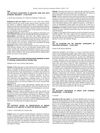
Search
for
Sort by
Research
660-690 / 1000+ results

research Evidence-Based Medicine in Obstetrics and Gynecology
Accurate diagnosis and timely, tailored treatments improve outcomes in obstetrics and gynecology.

research Successful Management of Hair Loss with Ayurvedic Treatment – A Case Study
Ayurvedic treatment improved hair growth in a person with hair loss.

research Glossary

research General Dermatology: Comprehensive Overview of Dermatological Conditions
The document explains various skin conditions and their treatments.

research Polycystic Ovary Syndrome and Cardiovascular Disease
PCOS increases the risk of heart disease and type 2 diabetes in women.

research Botanical Treatment for Polycystic Ovary Syndrome
Some plant-based treatments may help with ovary function, insulin resistance, and excess male hormones in PCOS, but more research is needed to confirm their safety and effectiveness.

research Innovations in Chemotherapy and Radiation Therapy: Implications and Opportunities for the Asia-Pacific Rim
New cancer treatments are more precise and less toxic, improving survival rates, but Asia faces challenges in adopting these advancements.

research Skin Abnormality and Hair Loss: The Reproductive Endocrinological Viewpoint
Hormonal imbalances can cause skin and hair problems in women, and treatments that block male hormones can help.

research Book Reviews
The reviews highlighted practical advice and insights from various psychology and therapy books.

research Toward Optimal Health: The Experts Respond to Hair Loss in Women
Hair loss in women is often due to hereditary conditions or stress, and while treatments like minoxidil can help, diagnosis and management require medical guidance.

research Women With Clinically Significant Hirsutism Always Have Detectable Endocrinological Abnormalities
Most women with excessive hair growth have a hormonal cause.

research Consensus on Women's Health Aspects of Polycystic Ovary Syndrome: The Amsterdam ESHRE/ASRM-Sponsored 3rd PCOS Consensus Workshop Group
Experts agree that PCOS affects women's health in complex ways, but more research is needed to understand and treat it effectively.

research Polycystic Ovary Syndrome: Etiology, Pathogenesis, and Diagnosis
The document concludes that PCOS is a complex disorder caused by both genetic and environmental factors, affecting women's health in various ways, and requires personalized treatment.

research Androgens and Cardiovascular Disease
Male hormones may play a role in the development of heart disease, and more research is needed to understand their effects.

research Melatonin Membrane Receptors in Peripheral Tissues: Distribution and Functions
Melatonin affects many body functions beyond sleep by interacting with specific receptors in various tissues.

research Steroid Sulfatase: Molecular Biology, Regulation, and Inhibition
The enzyme steroid sulfatase is linked to breast cancer and other conditions, and inhibitors are being developed for treatment.

research National Lipid Association Recommendations for Patient-Centered Management of Dyslipidemia: Part 2
The guidelines suggest lifestyle changes, diet adjustments, and personalized medication to manage dyslipidemia and reduce heart disease risk.

research Corticosteroids for the Treatment of Duchenne Muscular Dystrophy
Corticosteroids, especially prednisone, improve short-term muscle strength in Duchenne muscular dystrophy but have manageable side effects.

research Potential Role and Therapeutic Interests of Myo-Inositol in Metabolic Diseases
Myo-inositol supplements may improve insulin sensitivity and help with conditions like PCOS and gestational diabetes, but more research is needed.

research The Rotterdam Study: 2018 Update on Objectives, Design, and Main Results
The Rotterdam Study updated findings on elderly health, focusing on heart disease, genetics, lifestyle effects, and disease understanding.

research The Rotterdam Study: 2016 Objectives and Design Update
The Rotterdam Study found risk factors for elderly diseases, links between lifestyle and genetics with health conditions, and aimed to explore new areas like DNA methylation and sensory input effects on brain function.

research The Rotterdam Study: 2014 Objectives and Design Update
The Rotterdam Study aims to understand disease causes in the elderly and has found new risk factors and genetic influences on various conditions.

research The North American Menopause Society Recommendations for Clinical Care of Midlife Women
The NAMS 2014 recommendations guide healthcare providers on treating health issues in midlife women, emphasizing individualized care and informed decision-making.

research The Rotterdam Study: 2012 Objectives and Design Update
The Rotterdam Study updated its design and objectives in 2012, providing insights into various diseases in the elderly, including skin cancer, bone health, liver disease, neurological and psychiatric conditions, and respiratory issues.

research Transforming Growth Factor-Beta in Stem Cells and Tissue Homeostasis
TGF-β is crucial for tissue repair and can cause diseases if not properly regulated.

research The Rotterdam Study: 2010 Objectives and Design Update
The Rotterdam Study aims to understand various diseases in older adults.

research Metformin: An Old Medication of New Fashion: Evolving New Molecular Mechanisms and Clinical Implications in Polycystic Ovary Syndrome
Metformin helps manage polycystic ovary syndrome by improving insulin resistance and ovulation, but more research is needed on its full effects.

research The PDGF/PDGFR Pathway as a Drug Target
The PDGF/PDGFR pathway is a potential drug target with mixed success in treating various diseases, including some cancers and fibrosis.

research Erectile Dysfunction in Young Men: A Review of Prevalence and Risk Factors
Erectile dysfunction is increasingly common in men under 40, with many physical and psychological causes, and various treatment options available.